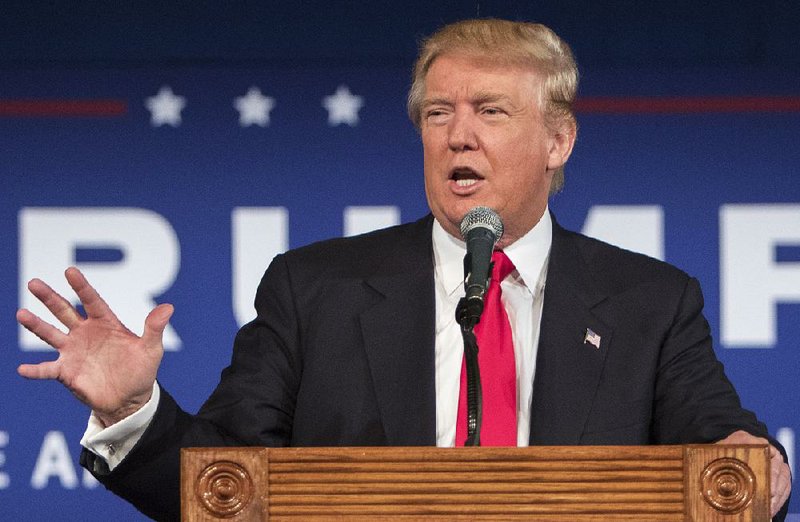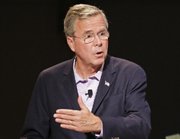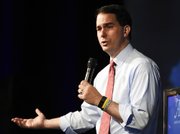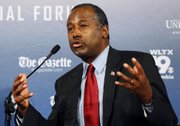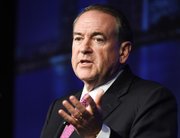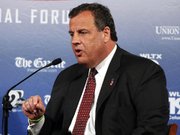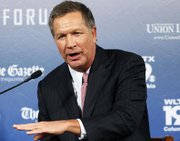Former Gov. Mike Huckabee of Arkansas is in, but former Gov. Rick Perry of Texas is out of Fox News' Republican debate Thursday night in Cleveland, officials with the cable channel said Tuesday.
The channel announced the 10 candidates who will have a podium spot for the main forum at 8 p.m. CDT, answering the question of which lower-polling candidates will make the cut for the first debate of the 2016 presidential contest. The remaining seven will be part of an earlier forum airing at 4 p.m. CDT that day.
Fox News' "decision desk," which does its election-night calls, sifted five national polls, including the network's own survey released late Monday, to select the top 10 candidates for the debate on the basis of the polling.
Others in the lineup are billionaire businessman Donald Trump, former Gov. Jeb Bush of Florida, Gov. Scott Walker of Wisconsin, Sen. Marco Rubio of Florida, Sen. Ted Cruz of Texas, Sen. Rand Paul of Kentucky, retired neurosurgeon Ben Carson, Gov. Chris Christie of New Jersey and Gov. John Kasich of Ohio.
With the largest field of contenders in modern memory, organizers say something had to give to ensure the debate in Cleveland didn't turn into a nationally televised circus.
"We never, ever envisioned we'd have 17 major candidates," said Steve Duprey, New Hampshire's representative to the Republican National Committee who helped craft the debate plan. "There's no perfect solution."
The current rules mean that a sitting governor, Bobby Jindal of Louisiana, and a sitting U.S. senator, Lindsey Graham of South Carolina, will be relegated to the second-tier event.
Others left out of the main event were Perry, former Pennsylvania Sen. Rick Santorum, former New York Gov. George Pataki, former Virginia Gov. Jim Gilmore and former technology executive Carly Fiorina, the only female GOP candidate.
There were few options for how Fox News, which was awarded the first sanctioned Republican debate after a process worked out by the Republican National Committee, could navigate such a sprawling field. Republican officials worked closely with TV executives, although the television networks have the final say about which candidates will be allowed on stage for their televised events.
Republican officials were particularly concerned about Fiorina's status, hoping she would help balance Hillary Rodham Clinton's push to rally women to her candidacy.
While Trump was far and away the front-runner in the five most recent national polls that determined the debate lineup, several candidates were grouped together in the single digits, most separated by a number smaller than the margin of error.
For example, in a Monmouth University survey released Monday, Kasich was the 10th candidate with the support of 3.2 percent of voters.
But after taking the margin of error into account, Monmouth noted that Kasich's support could be as low as 1.5 percent, while almost any of the candidates who polled lower could be that high or higher.
Monmouth found that only five candidates -- Trump, Bush, Walker, Cruz and Huckabee -- were definitely in the top tier of candidates, while just two -- Pataki and Gilmore -- would not make it into the top-10 even when margin of error was taken into account.
"I don't know why they didn't just do one large poll of primary voters," said Matthew Dowd, a former adviser to President George W. Bush.
"This has been one of the best quality fields we've seen in a long time; it's just an amazing field," said David Winston, a top Republican pollster who worked for Newt Gingrich in the 2012 presidential race.
Of those who did not make the prime-time debate, he said, "these are quality candidates who have earned the right to be involved in a presidential debate."
There should have been a way to accommodate sitting senators and governors with records of accomplishment, Winston said.
"I understand that having that many candidates is a challenge, and it's a problem they should have figured out a way to resolve," he said.
Allies of some candidates who were spurned are turning their attention to the early nominating states.
"The debate's gotten disproportionate attention -- the real race is happening in Iowa and New Hampshire," said Brad Todd, an adviser to the super PAC supporting Jindal, who has been attracting large crowds in Iowa.
Todd said his group plans to air a 60-second ad in Iowa during the debate, one that criticizes the forum taking place in Cleveland.
"The donor class will not pick the nominee, nor will the establishment in Washington, nor a cable network," Todd said. "I think it could have been done better for all concerned."
Perry, the former Texas governor, is "going to have a very thoughtful conversation about the country and what he thinks ought to be done for the opportunity for this country," said Jeff Miller, an adviser to Perry.
And there are certain upsides, he said: "There's a good chance that ... debate stage is going to be turned into a circus."
Trump's rapid rise has surprised many Republicans, some of whom fear his rhetoric on immigration and other divisive issues could hurt the party.
In a Tuesday interview, Trump said he's been defying expectations all his life.
"I think people are tired, they're sick and tired of incompetent politicians," he said on MSNBC's Morning Joe when asked to explain his rise.
Candidates have begun to turn their attention toward Trump. Asked about Trump while courting religious conservatives Tuesday, Bush said the businessman's rhetoric on immigrants is "wrong."
"We have a different tone and a different view," he said. "I respect the fact that he's the front-runner for the Republican nomination. This is a serious thing. But I think to win and govern the right way, we have to unite rather than divide."
Christie, in a television interview earlier in the day, called Trump his friend but suggested he'd be willing to challenge him if necessary.
"If I believe there is something that needs to be said on that stage Thursday night, I'll say it," Christie said on Morning Joe.
Fox News hosts Bret Baier, Megyn Kelly and Chris Wallace will moderate the two-hour debate.
Candidates will get one minute to answer each question addressed to them by the moderators, according to two people familiar with the cable channel's plans. Candidates who are called upon will be given 30 seconds for rebuttals.
If a candidate's name is invoked during someone else's answer to a question, that candidate will get a chance to respond for a length of time at the moderator's discretion.
As the candidate with the highest poll average, Trump is expected to stand at the center of the stage, with lower-polling candidates fanned out in alternating order to the left and right.
Information for this article was contributed by Maggie Haberman of The New York Times; by Steve Peoples, Emily Swanson and Eric Schelzig of The Associated Press; and by Ben Brody and Kendall Breitman of Bloomberg News.
A Section on 08/05/2015
